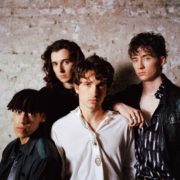REVIEW: Blanco – City of God [@blanc0b0urne]
![REVIEW: Blanco – City of God [@blanc0b0urne]](https://guap.co/wp-content/uploads/2021/09/dpfqewkenbgaoe7chkq5-180x180.jpeg)
Words by: Dwayne Wilks
The Harlem Spartan enjoys the solace of his own lane on his debut project, City of God.
Harlem Spartans are one of Drill’s foundational groups, helping to build the sound that is now heard on streets as far east as Brooklyn and as far south as Accra. City of God shows Blanco’s progression since the days of Harlem Spartan anthems like “Kennington Where It Started” that has seen him forge a path as yet unprecedented. He’s ventured beyond the menacing sonics of Drill, instead opting to litter 2020 with bops that are Baile Funk infused – a genre found in the parties and festivals of Rio De Janeiro.
The result was an avant-garde sound that people can’t help but love. The marrying of his slick flow with beats that feel tropical and humid was, and still is, refreshingly new. Although not the very first in the UK Rap scene to incorporate the Baile Funk bounce (producer and rapper Jevon likely lays claim that title), Blanco has brewed a sound that is uniquely his own. City of God sees him draw from all of his influences and each of his interests to craft a captivating debut project.
Some of City of God‘s early tracks like “Pain”, “Dennis Rodman” and “Cerberus” which features Loski and K-Trap feel like nods to Blanco’s more raw Drill beginnings. But even with today’s vogue sounds driving the project’s early section, Blanco exhibits his one-of-one lyricism – absent swear words or profanity, instead, there’s an abundance of allusions to sports and anime used to detail the street life and its caveats. “Asura & Indra” is followed by “Dennis Rodman”, on the latter of which Blanco spits, “I was on the stand with the witness sarge’, tryna’ save man’s skin like I’m Van Der Sar/Jump man, ain’t doing no bungie, black Batman vs Solomon Grundy”.
A glance at the tracklist is all it takes to see the inspirations from which City of God is comprised.“Pain”, “Asura & Indra”, “Shippuden”, and “Itachi” all references to the anime and manga Naruto (and its follow up Naruto Shippuden) and some of the tracks even include audio from the show. “TSG”, “Surveillance” and “Time Out” all being allusions to the police. And of course, the project’s name derives from the multi-award winning and Academy Award nominated Brazillian film City of God (Cidade de Deus) – the influence from which is more stylistic in the inclusions of the Baille Funk elements on records across the project as well as the shared narratives of criminality and the struggles to escape it.
Blanco‘s skippy, punchline heavy flow sits most comfortably on the Baile Funk-Drill fusion sound that is essentially patented as his own, phased in towards the middle of the tape. Onward from last year’s summer hit “Shippuden” he delivers “Time Out” which opens with a skit from fellow Harlem Spartan, the late Bis which sets the somehow poignant mood of the track despite the Baile Funk bounce employed and bars like “In the field looking like Kante’s heatmap”. This mood carries on to the next track “Fala”. Progressing from his usual subject matter, “Fala” finds in a Blanco reflective mood as he raps “Favelas, I was raised in the slums/Seeing mum speaking in tongues/Seeing tugs speaking with guns/See a gun, breaching a lung” around the Portuguese sample that functions as an infectious hook.
“Surveillance”, supported by NSG, is a natural fit of styles with the two acts bringing their respective warm weather vibes to the table. “TSG” again borrows the Baile Funk bounce of Brazil to great effect, while “Safe Space” closes the project on a personal and honest note. By the time you get to the end of the mixtape, Blanco has demonstrated that he is in a space that only he can occupy. His Angolan background, his integration of his love for football and anime and his easy, slick flow all merge to form a project that no one else in the scene should try to replicate. Until Blanco decides to return with more favela-inspired anthems, City of God gives us more than enough to bop, sing along and samba to.




![ZINO VINCI’S ‘FILTHY & DISGUSTING’EP BRINGS YOU TO THE CORE OF THE ARTIST [@ZinoVinci]](https://guap.co/wp-content/uploads/2023/10/Zino-4.jpg)




